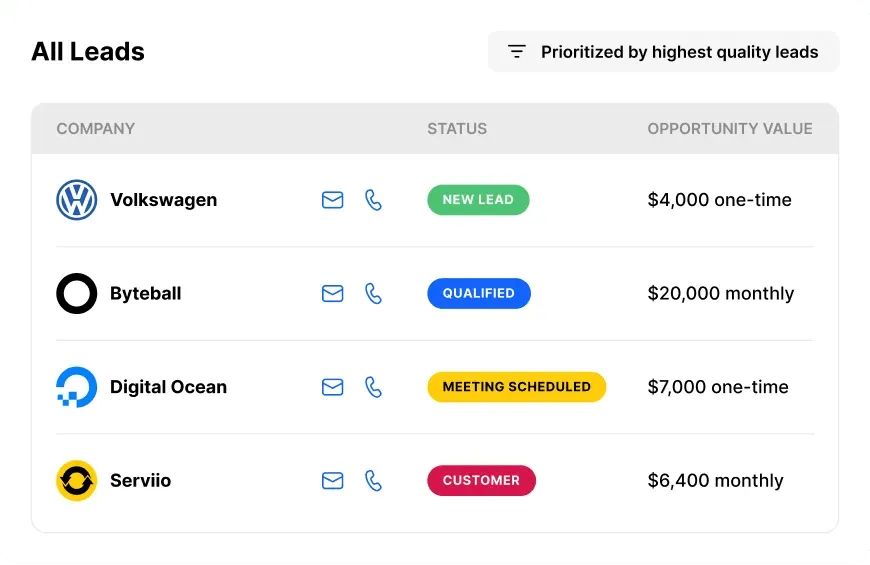
Tell me if this sad tale sounds familiar:
Your marketing team generates a new lead. You contact them and begin the sales process. Unfortunately, after numerous calls, emails, and texts, you realize the lead isn't a good fit for your company's products and/or services. All of those hours were totally wasted.
This happens to sales teams All. The. Time. Luckily, there's an easy solution: qualify leads before you reach out to them. This will save you a lot of effort—guaranteed.
In this article, we’ll cover what a sales qualified lead is and why they're so important. I’ll also discuss the difference between a sales qualified lead and a marketing qualified lead, how to develop a legitimate lead qualification process, and a few best practices to qualify leads effectively.
What Is a Sales Qualified Lead?
A sales qualified lead (SQL) is a lead that has moved from the marketing funnel to the sales funnel. The sales team has deemed them likely to convert based on demographics or behavior.
While different companies define SQLs in different ways, in general, they match your buyer persona or ideal customer profile and have expressed interest in the products and/or services you sell, and (hopefully) agreed to meet with you.
Not every lead you receive as a sales rep will be worth your time. In fact, depending on your company's marketing strategy, a significant portion of your leads might not be SQLs.
Sales qualification boosts rep productivity by helping you focus on sales-ready leads. When this happens, your productivity levels and conversion rates will rise. Win!
One more thing: sales qualified leads and sales accepted leads are not the same.
As mentioned above, sales qualified leads are people and companies that will probably buy something from you in the future. Sales accepted leads, on the other hand, are just leads that a sales team accepts from their company's marketing team and agrees to nurture.
Eager to outperform your sales goals? Dive into our comprehensive guide on the transformative power of sales productivity tools.
What’s an Example of a Sales Qualified Lead?
An SQL isn’t just any old lead–it’s one that is ready for sales to connect with and nurture. So what does that look like in practice? Let’s look at an example.
 |
Dunder Mifflin is a lead in our Close dashboard. They have downloaded a resource guide on founder led-sales and are in our target company size. We can also see that they watched our demo video, which means they are at least considering a new CRM.
They are an SQL because they:
- Are in our target market
- Have expressed interest in making a purchase
For Close, this would be an SQL and our sales team is likely to reach out. They might email the decision maker or try to set up a sales call to see if they have any questions.
MQL Vs. SQL: What’s the Difference Between a Marketing Qualified Lead and a Sales Qualified Lead?
Your company's sales pipeline includes marketing qualified leads (MQLs) and sales qualified leads (SQLs). So, what’s the difference?
An MQL is a lead your marketing team considers likely to convert into a paying customer—at least, compared to other leads they've generated.
If the lead clicks on a specific CTA, or visits a certain page on your company's website, or interacts with branded content on social media, or downloads a free report…there's a chance they might eventually buy something from your team.
So, the main difference between MQLs and SQL is where they sit in your sales funnel.
MQLs have been vetted by marketing teams and moved into the next stage of the buyer's journey. SQLs have been vetted by sales teams and become bonafide prospects. A proper lead management process will have distinct processes for each type of lead.
Why Identifying Sales Qualified Leads Matters (Or Does It??)
Maybe you're thinking, "What's the big deal? Marketing handles lead generation, I close deals, the company makes money. Who needs SQLs?" The truth is, understanding what SQLs are and how they compare to MQLs helps improve sales process efficiency, drive revenue, and a whole lot more. Let's take a closer look at each of the benefits of understanding what SQLs are and where they come from:
SQLs Improve Sales Process Efficiency
It's pretty simple: high-quality leads convert into paying customers more often than low-quality leads. Want to close deals faster? Learn to identify SQLs and shorten your sales cycles.
Think about it: when you know which leads are interested in your company products and/or services, you can focus most of your attention on these people/companies.
You'll also be able to adjust your messaging to accommodate your SQL's increased interest. For example, you can skip the lead nurturing phase and schedule a sales meeting immediately. Why waste time with sales enablement materials if your prospect wants to buy now?
 |
Improved Customer Satisfaction
Identify SQLs and your sales process will become more efficient, leading to more deals. But that's not the only benefit you'll enjoy. This sales activity will also produce happier customers.
How so? Well, MQLs and SQLs require different approaches. As mentioned above, you'll need to send sales enablement materials to MQLs. This is because they're still learning about your company and aren't convinced your products/services are right for them.
But SQLs are much closer to a purchasing decision. You don't want to bore them with blog posts and ebooks. You want to get them on the phone, make your pitch, and close.
When you deliver the right buying process to each customer, you'll make more sales. You'll also generate happier customers because they'll appreciate the personalized experience you crafted for them. Guess what satisfied customers do? Spend more money with your brand.
Higher Conversion Rates 🙌
By definition, MQLs appear earlier in the customer journey than SQLs. So, an easy way to increase your conversion rate is to spend more time selling to SQLs.
Here's my logic: your SQLs are closer to purchase than your MQLs. As such, a higher percentage will likely convert into paying customers.
A higher conversion rate will help you close more deals and earn more commissions. It will also make your manager happy, which might result in a promotion, a raise, or other perk.
Increased Revenue Numbers 📈
What do a more efficient sales process, happier customers, and higher conversions lead to? A bump in company revenue. It's not brain surgery: if you sell faster, close more often, and encourage existing customers to continue buying, you'll make more money.
As a salesperson, you're paid to turn your company's potential customers into long-term revenue sources. This is easier to do when you learn to identify sales qualified leads.
How to Get More SQLs (A.K.A.: How to Improve Your Lead Qualification Process)
As with most things in the sales world, building a repeatable process is key to driving more SQLs. With decades of sales experience, our sales team has a solid understanding of how to drive more SQLs. Here’s the process we use to drive qualified leads:
1. Revisit Your Ideal Customer Profile
I know, I know. This feels a little too beginner right? The thing is, your ICP will change over time. If you haven’t done this step recently, I highly recommend it. I promise it's worth the time to really pinpoint your company's target audience.
Who do you sell to? What are their hopes and fears? What challenges do they face daily? If your target audience is SMB (small medium businesses) how do you define SMBs? By revenue, employee headcount–or something else? And finally how can your products/services help these prospects overcome the challenges they face?
Now use these details to create an ideal customer profile, i.e., an imaginary business representing the company that most benefits from purchasing your product/service.
(Note: if you sell B2C, you'll want to create a buyer persona rather than an ideal customer profile.)
2. Use the Right Marketing Channels
Now that you know your ideal customers, brainstorm ways to reach them.
There are dozens of marketing channels available to you.
For example, you can implement a long-term SEO strategy to generate leads on autopilot, level up your social media game to connect with prospective customers on sites like LinkedIn and Twitter, or host webinars to educate your target audience about their pain points.
Now, I realize you're a salesperson, not a marketing professional. So, it may be best to collaborate with your company's marketing team to complete this step. Don't worry: your efforts in this area will be more than worth it when you score more SQLs.
Elevate your business growth through strategic lead generation on LinkedIn.
3. Choose a Lead Qualification Approach
At this point, you know exactly who you want to sell to, and your marketing efforts are designed to reach them. Now you need to decide how you'll qualify leads.
You can develop a proprietary system based on your own qualification criteria. Or you can use one of the tried and true sales methods outlined below. It's totally up to you.
- BANT: Qualify leads based on their budget (how much are they willing to spend?) authority (is this lead a decision-maker?) need (will my product/service solve this lead's issue) and timeline (is this lead ready to buy now or some time soon?)
- MEDDIC: Qualify leads by evaluating metrics (how much time/money will your product or service save your lead?) the economic buyer (are you talking to someone with authority?) their decision criteria (what factors will determine their purchasing choice?) their decision process (how does this lead approve purchases?) by identifying their pain (what are the lead's business objectives?) and potential champions (who inside the target company will promote your products/services to their colleagues?)
- FAINT: Qualify leads based on their funds (which prospect has the most money to spend?) authority (which of these big-budget prospects can make purchasing decisions?) interest (which authoritative prospects are most interested in what you sell?) need (which interested prospects need what you sell?) and timing (which needy prospect is ready to buy your products and/or services right now?)
- ANUM: Qualify leads by evaluating their authority (can this person make a purchase decision?) need (does this individual or company need what I sell?) urgency (is this prospect ready to buy something now?) and money (do they have the funds to buy?)
- CHAMP: Qualify leads based on their challenges (can your product or service help them overcome their struggles?) authority (does your prospect have the power to make a buying decision?) money (can the prospect afford you?) and prioritization (is this deal a priority for your prospect or is it a backburner issue for them?)
 |
4. Focus on the Best Leads
There's only one thing left: focus on the best leads in your sales pipeline. Doing so will produce more revenue, as I talked about above.
Now, assuming your ideal customer profile is on point and your company's marketing strategy is dialed in, you should enjoy a steady stream of red-hot leads. Which should you pursue?
This is where lead scoring comes in. If you're unfamiliar with the term, lead scoring is a process by which sales and marketing teams determine which leads are most likely to buy from them. Once they determine this, they'll know which leads to contact first.
There are tons of ways to score leads. You can use demographic details, for example, like company size, physical location, and job title. You can use behavioral data, such as whether or not your prospect started their free trial or downloaded a free ebook. It's up to you.
You can assign each a numerical value when you know the criteria you'll use to score leads.
For example, company size, physical location, and job title may account for one point, while downloading an ebook accounts for two and starting a free trial accounts for three. You can then evaluate leads, see who scores the highest, and reach out to the top prospects.
Ready to transform your leads? Learn the ropes of successful challenger selling.
3 Best Practices for Qualifying Sales Leads
Let’s go over a few best-practices to streamline the sales qualification process. Implement these three tips to produce more SQLs than ever before.
Talk to Your Current Customers
When was the last time you interviewed one of your customers?
If it's been a while, set aside time to talk to your company's patrons. Doing so will help you learn more about your target audience and dig deep into their current struggles.
Industries change, after all. So do people. You won't close deals if you base your entire sales strategy on outdated information. Fortunately, there's an easy fix to this problem.
All you have to do is peruse your department's CRM software. Which customers have been with you the longest? And which spend the most money? Shoot these people a quick email and ask them if they can meet. Give them a small incentive for their trouble if you need to. Just make sure you book a few meetings to get reacquainted with your target market.
Collaborate with Marketing
The only way to source a high volume of SQLs is to collaborate with your company's marketing team. If you don't, they won't send you sales ready prospects.
Talk with marketing to determine who your target audience is, how they'll reach these people with their various campaigns, and when in the sales cycle they should send you leads. Then meet regularly with them to facilitate communication and ensure you're on the same page.
Make Use of Technology
Last, invest in a few apps to make the sales qualification process easier.
A reliable CRM, for example, will let you build in-depth customer profiles, complete with must-have contact information like phone numbers and email addresses. You can then use these details to connect with your prospects, arrange sales meetings, and close deals.
The best CRMs include automation features, too, which can be used to schedule email campaigns that make sales while you sleep. We also can't forget about the reporting capabilities inside CRMs that'll help you understand which sales activities are more effective. That way, you can eliminate poor-performing tactics and double down on the most effective strategies.
Win with Qualified Leads
Learn to produce sales qualified leads, and you'll close more deals.
Qualifying leads is pretty simple. Just define your ideal customer profile, use the right marketing channels, choose a lead qualification approach, and focus on the best leads.
Remember to talk to your customers on a regular basis, collaborate with your company's marketing department, and invest in well-rated technology solutions. Doing so will help you streamline your sales process, boost customer satisfaction, and drive more revenue.
Speaking of technology solutions, have you tried Close yet? Our industry-leading CRM platform for startups and small businesses has all the features you need to close deals.
Sign up for a free trial of Close today to enjoy features like predictive dialers, a full-fledged email and text messaging sequencer, task automation features, and killer sales reports.










